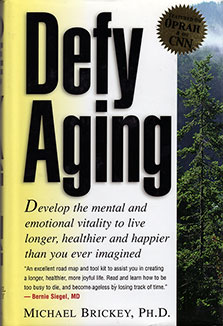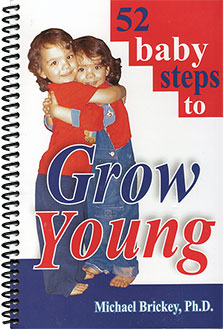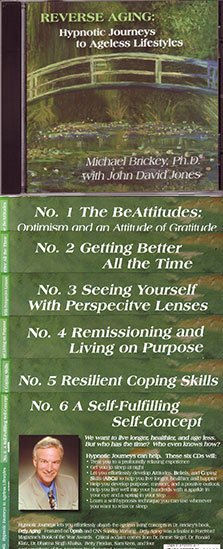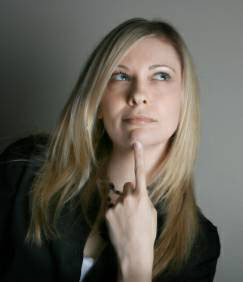The Defy Aging Newsletter
Anti-aging psychology, holistic health, and wellness
These are archives of a biweekly e-mail newsletter for helping you think, feel, look, and be more youthful and live with purpose.
Number 132
This issue:
If you didn't have insurance...
ACTION TO TAKE
Consider what you would do you if you did not have health insurance or if you had a Health Savings Account.
WHY
I remember when there was no dental insurance. You went to the dentist and you wrote a check for the bill. Now many people have dental insurance and have to check whether the dentist is on the plan, what is covered, etc. The dentist in turn has to enroll in and track dozens of insurance plans. The result is a bureaucratic morass that adds to the cost of the system overall. Dental insurance is appealing to employees who receive the coverage as an employee benefit. To them it seems like a free benefit.
By its nature, insurance restricts choice, rewarding some providers and penalizing others. Traditional insurance rewards traditional medicine and traditional pharmaceuticals. As health savings accounts become more common, consumers will have more choice. Depending on how HSA plans are written, HSAs may enable consumers to choose to spend healthcare dollars on alternative medicine treatments such as massage, acupuncture, and Pilates classes. They may enable reimbursement of supplements such as herbs, vitamins, and hormone therapies. They may even cover spas, health clubs, and weight loss programs. Psychotherapy, which is often only covered at 50% and then only with managed care authorization, would no longer be capped or micromanaged. Personal coaching might even be covered.
There is an terrible inequity in the current system in that those who pay cash (relieving the healthcare practitioners of large, cumbersome billing expenses) end up paying more as they don’t get the discounts insurance companies demand. As HSAs become more common, consumers will insist on not paying more than doctors charge insurance companies. They may (and should) even insist on cash discounts.
HSAs save money by greatly reducing (but not eliminating) the bureaucratieaucratic overhead. They give the consumer more choice. They will ultimately separate employment from healthcare, making it easier to change jobs. The primary downside is that employees often see HSAs as an attempt by management to cut costs by reducing benefits (as is sometimes the case). Paul Zane Pilzer says 90% of people can purchase healthcare insurance for half of what it cost employers and once purchased it cannot be cancelled or raised beyond normal cost increases. This can be a wonderful solution to many individuals, especially those who currently do not have healthcare insurance. At a macro level, however, it is a shell game as costs for the 10% with serious health problems are shifted to government funding.
As you have probably gathered, my libertarian penchant likes HSAs while my ultimate preference would be insurance for catastrophic events and out of pocket payment for everything else. The question is: If you had an HSA instead of your current insurance, would you spend healthcare funds differently? If so, what has been your personal cost of not pursuing the healthcare choices that you consider optimal? What choices would you make if you had the money your employer currently spends on insurance and you had to pay for all of your medical expenses out of pocket?
QUOTES
Most Americans receive health insurance from their employers and lose their health insurance when they lose their jobs, but that's about to change....Employer sponsored healthcare will be mostly eliminated in the next twenty years.
~Paul Zane Pilzer, author of The New Healthcare Insurance Solution
Discussion on a blog: "Government today restricts our medical choices in countless ways, direct and indirect, which has led many to call for a Canadian style, single-payer system. Sorta homeopathic, isn’t it? A LARGER dose of the poison that’s killing us will actually be the cure." Another reader astutely commented, "Actually that’s allopathy." [Homeopathic medicine uses minute quantities of toxins to produce cures; allopathy is traditional medicine.]
~from DB's Medical Rants, www.medrants.com
HUMOR
A man awakened after emergency heart bypass surgery to find himself at a Catholic Hospital. A nun asked him how he was going to pay. He explained that he did not have any health insurance or savings. "Do you have any relatives who could help?" asked the nun. "I only have a spinster sister, who is a nun," He replied. Angrily, the nun protested, "Nuns are not spinsters! Nuns are married to God." The patient replied, "Then send the bill to my brother-in-law."
Reprint this article from:
THE DEFY AGING NEWSLETTER
Anti-Aging Psychology
Holistic Health and Wellness
This newsletter article may be reprinted in E-zines, newsletters, newspapers, and magazines provided the content is not edited and the attribution below is given. Formatting may be changed and you may use one of the web site pictures of the author to accompany the article.
"Dr. Michael Brickey, The Anti-Aging Psychologist, teaches people to think, feel, look and be more youthful. He is an inspiring keynote speaker and Oprah-featured author. His works include: Defy Aging, 52 baby steps to Grow Young, and Reverse Aging (anti-aging hypnosis CDs). Visit www.NotAging.com for a free report on anti-aging secrets and a free newsletter with practical anti-aging tips."






